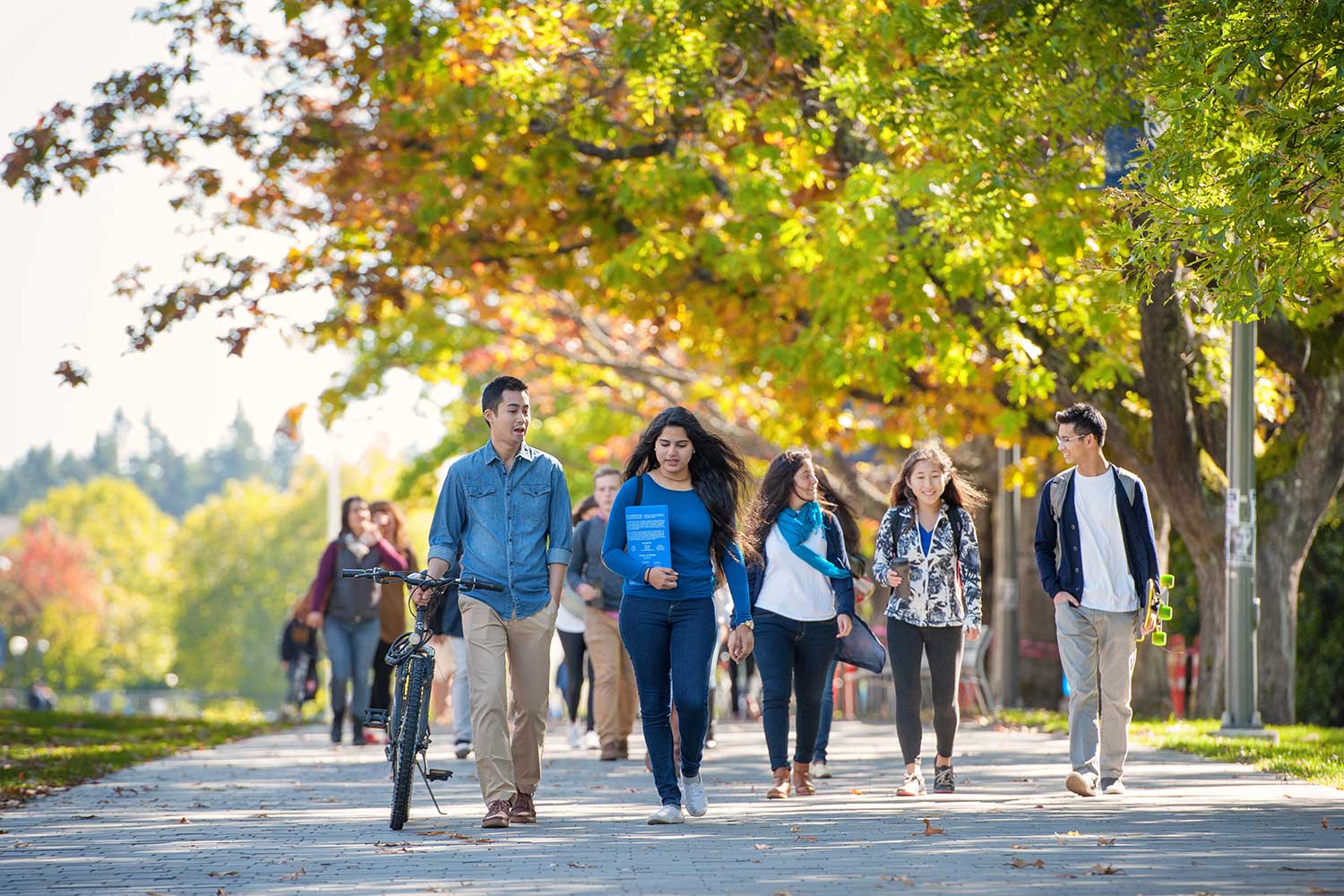Modern European Studies (MEST) is an interdisciplinary undergraduate program administered by the Department of Central, Eastern and Northern European Studies (CENES). The MEST program allows students to take a wide range of Arts-based courses and develop their own research focus on particular languages, regions, themes or historical periods. MEST emphasizes Europe’s linguistic and cultural diversity and foregrounds critical perspectives on Europe and European phenomena in both local and global contexts.
Major in Modern European Studies
The MEST program offers a Major which builds foundational knowledge and skills in Modern European Studies while promoting research diversity. As a MEST Major you can work across disciplines, in a multilingual environment, and become familiar with aspects of European history, journalism, law, international relations as well as cultural and literary studies. In consultation with the Director of Undergraduate Studies, students identify a research concentration of their choice.
Program Features
- Broadly based concentration in European Studies
- Thematic, regional and linguistic research focus of choice
- Inter- and cross-disciplinary work mentorship
- Impactful experiential learning


MEST is ideal for developing an understanding for the rich, complex and nuanced culture of Europe. It is multi-faceted, dynamic and adaptable, and pairs well with other areas of study such as political science, economics, history, and international relations. If you have questions, there are great professors and students in the program who can give you advice and guide you along the way.
Major Requirements for Modern European Studies
100- and 200-level courses
6 credits from the list of approved courses
300- and 400-level courses
30 credits from the list of approved courses
Language Requirement
12 credits of a European language (broadly conceived) other than English. Literature or Cultural Studies courses taught in the student’s chosen European language count as equivalent, as do European language courses taken to fulfill other programs’ requirements.
Approved Courses to Fulfill Major Requirements
Arts One
- ARTS 001A: Arts One
Central, Eastern and Northern European Studies (CENS)
- CENS 201: Contrasts and Conflicts: The Cultures of Central, Eastern and Northern Europe
- CENS 202:Great Works of Literature from Central, Eastern and Northern Europe
Cinema Studies (CINS)
- CINE 210: Early Cinema
German Studies (GMST)
- GMST 229: Exile, Flight and Migration
- GMST 274: The Frankfurt School
History (HIST)
- HIST 220A: History of Europe
Political Science (POLI)
- POLI 110: Investigating Politics: An Introduction to Scientific Political Analysis
- POLI 260: Introduction to Global Politics
Romance Studies (RMST)
- RMST 202: Introduction to Literatures and Cultures of the Romance World II: Modern to Post-Modern
Slavic Studies (SLAV)
- SLAV 105: Introduction to Russian and Slavic Culture
Anthropology (ANTH)
- ANTH 303D: Ethnography of Special Areas - CELT FRING&DIASP
Art History (ARTH)
- ARTH 339:19th-Century Art and Social Space
- ARTH 340: 20th Century Art and Culture: The Triumph and Demise of Modernism
- ARTH 341: 20th Century Art and Culture: The Postmodern
- ARTH 347: Architecture in Europe: Modern Paradigms of Design (1837-present)
Central, Eastern and Northern European Studies (CENS)
- CENS 303: Representations of the Holocaust: Ghetto
- CENS 304: Representations of the Holocaust: Auschwitz
- CENS 308: Comics and Graphic Novels in Central, Eastern and Northern Europe
- CENS 404: Gender and Nation: Women's State in Modern Central, Eastern and Northern European Literatures and Cultures
Economics (ECON)
- ECON 319: History and Philosophy of Economics from Ricardo to Keynes
- ECON 334: Economic History of Modern Europe
French (FREN)
- FREN 341: Arts, Cultures and Society from Romanticism to the Present Day
Geography (GEOG)
- GEOG 302: Climate Justice
- GEOG 353: Geographies of Migration and Settlement
- GEOG 391: Modern Europe: Places and Borders
German (GERN)
- GERN 347: Progress and Disaster: Studies in the 20th and 21st Centuries
German Studies (GMST)
- GMST 325: The Culture of Nazism
- GMST 335: German Cinema
- GMST 346: Germanophone Literature 1900-1945
- GMST 347: Germanophone Literature after 1945
- GMST 420: Studies in Modern German-speaking Culture
- GMST 424: Selected Issues in German-speaking Culture
- GMST 427: Major Controversies in German-speaking Culture
- GMST 433: Germanophone Representations of the Holocaust
- GMST 436: Special Topics in Germanophone Cinema
- GMST 440: Selected topics in Germanophone Literature
- GMST 445: Words and Music in Germanophone Literature
- GMST 475: German Media Studies
History (HIST)
- HIST 315: Britain 1750-1850
- HIST 317: Britain, 1850-1918
- HIST 318: Early Twentieth-Century Britain
- HIST 319: Britain, 1945 to the Present
- HIST 344: Ancient Regime France
- HIST 346: History of Modern France
- HIST 349: Imperial Russian History, 1800 to 1917
- HIST 350: The Soviet Union
- HIST 351: East Central Europe in the 19th and 20th Centuries
- HIST 354: The Ottoman Empire
- HIST 355: Nineteenth Century Germany
- HIST 356: Twentieth-Century Germany
- HIST 367: Europe in the Age of the Enlightenment
- HIST 368: Europe in the 19th Century
- HIST 369: Europe, 1900-1950
- HIST 370: Europe Since 1950
- HIST 436: European Social History
- HIST 439: Politics and Culture in Fin-de-Siécle Europe (1890-1914)
- HIST 441: History of the Holocaust
Music (MUSC)
- MUSC 354: Baroque Music
- MUSC 430: Major Composers
- MUSC 450: Selected Topics in Vocal or Instrumental Genres
- MUSC 455: History of Opera II
Nordic Studies (NORD)
- NORD 332: Nordic Studies in Focus
- NORD 333: Nordic Literary Cultures
- NORD 334: Nordic Contemporary Fiction
- NORD 336: Nordic Crime Fiction, Film and Television
- NORD 337: Nordic Cinema
- NORD 411: Nordic Drama and Film
- NORD 413: Baltic Cultures and Literatures
- NORD 414: Topics in Northern European Cultural Studies
Philosophy (PHIL)
- PHIL 314: Philosophy in the 17th Century
- PHIL 315: Philosophy in the 18th Century
- PHIL 414: Topics in the History of Modern Philosophy
- PHIL 416: Topics in 19th-Century Philosophy
- PHIL 431: Topics in Social and Political Philosophy
Political SCIENCE (POLI)
- POLI 326: European Politics: Selected Cases
- POLI 327: European Integration
- POLI 341: Contemporary Political Theory
- POLI 343: Theories of State and Society
- POLI 346: Democratic Theory
Polish (POLS)
- POLS 345: Introduction to Twentieth-Century Polish Literature
- POLS 424: Polish Literature and Film in Translation
- POLS 426: The German Nazi Holocaust in Polish Literature and Film (in English)
Religious Studies (RELG)
- RELG 315: History of Christian Thought
Romance Studies (RMST)
- RMST 300: History of the Romance Languages
- RMST 301: Prose Fiction and Non-Fiction of the Romance World
- RMST 302: Theatre and Poetry of the Romance World
- RMST 306: Language Contact and Multilingualism in the Romance-speaking World
- RMST 322: French Literature since the Revolution
- RMST 342: Italian Literature and Culture of the Modern and Contemporary Age
- RMST 345: Italian Fascism in Interdisciplinary Perspective
- RMST 355: Italian Cinema: Neorealism
- RMST 372: Hopscotch: Topics in Hispanic Literature
- RMST 373: Masterpieces in Hispanic Literature
- RMST 459: Topics in Modern and Contemporary Italian Literature and Culture
Russian (RUSS)
- RUSS 306: Russian Literature in Translation
- RUSS 316: Russian through Film (in Russian)
- RUSS 321: Imagining Location in Russian Literature (in English)
- RUSS 323: Fantastic Worlds in Russian Fiction (in English)
- RUSS 409: Contemporary Russian Literature after 1917
- RUSS 410: Women in Russian Literature and Culture
Slavic Studies (SLAV)
- SLAV 307: Literature and Film in Eastern Europe
Sociology (SOCI)
- SOCI 302: Ethnic and Racial Inequality
- SOCI 361: Social Inequality
- SOCI 461: Political Sociology
Spanish (SPAN)
- SPAN 321: Tradition and Diversity in Spanish History and Culture
- SPAN 358: Divergent Visions: Peninsular Literature and Culture since 1700
Theatre Studies (THTR)
- THTR 320: History of Theatre I
MEST Language Options
CENES offers a variety of courses for UBC students, that focus on languages spoken in Europe, including Danish, German, Polish, Russian, Swedish, Ukrainian, and Yiddish. MEST students can also choose languages spoken in Europe from the Department of French, Hispanic, and Italian Studies.

